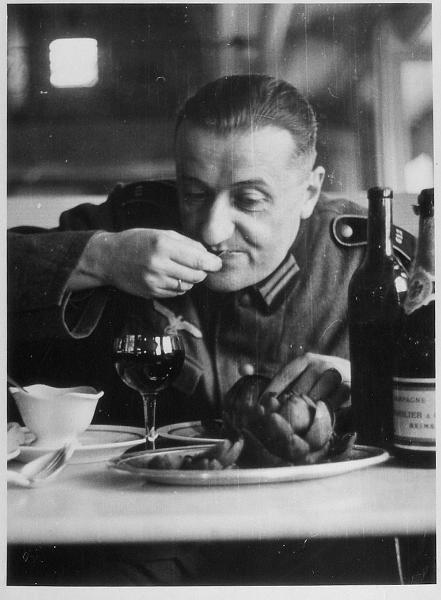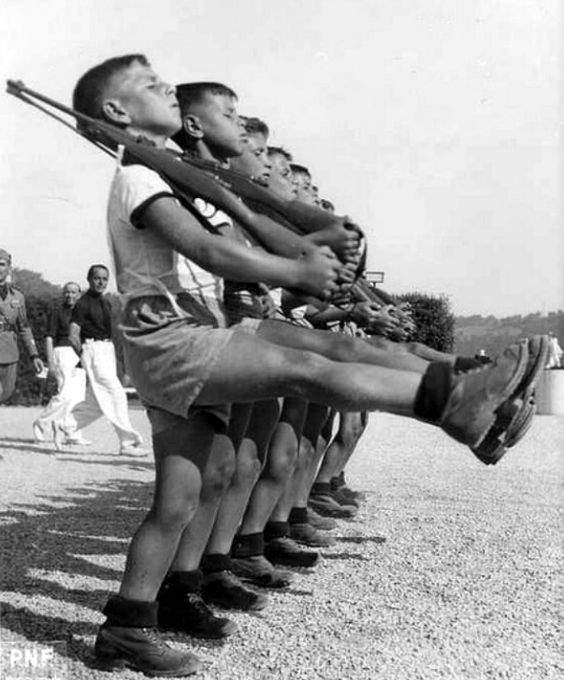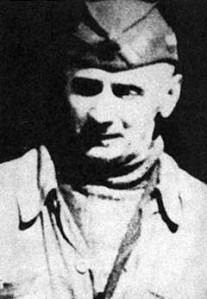Saturday 5 October 1940
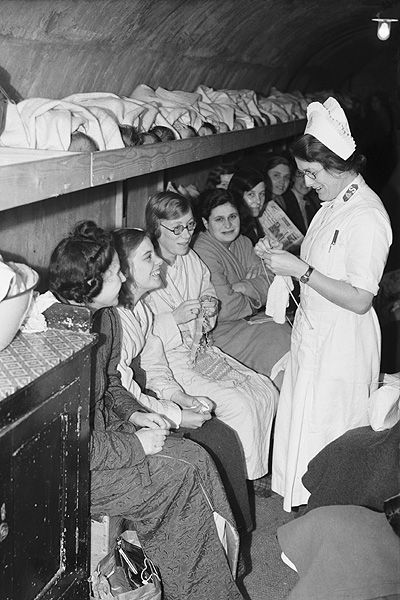 |
| An air-raid shelter run by the Salvation Army in Clapton, East London. 5 October 1940. |
Battle of Britain: The weather clears during the night, so on 5 October 1940 the Luftwaffe follows the pattern of alternating periods of activity by mounting a sustained effort today following some slow days. The battle has developed a definite rhythm, with the Luftwaffe adopting patterns that can last for days or weeks. This gives the RAF cues for successful interceptions, but it also can cause Fighter Command to be out of position when the patterns suddenly change due to some edict from Reichsmarschall Hermann Goering.
The early morning is occupied by German reconnaissance flights. The first large raid occurs at 09:30, when about 30 Bf 109 fighter bombers attack Dover, strafing the town and attacking barrage balloons. Fighter Command takes its time intercepting, and the German planes are long gone by the time any Hurricanes or Spitfires arrive.
A much more serious raid transpires around 10:45, when about 150 aircraft of Bf 109s and 110s raid Kent. about two-thirds of the fighters head for London, while the remainder lingers on the coast. This is another fighter-bomber attack, and as soon as the Germans spot RAF fighters, they drop their loads at random and engage the British. This results in massive dogfights over London. The bombs drop on Hastings, causing unintended damage.
Following behind the first formation is a second, composed of Bf 110s. This raid appears to be timed to catch the RAF fighters "in-between" the opening attacks and their ability to refuel and engage again. RAF No. 303 (Polish) Squadron is scrambled, though, and engages the Bf 109 escort. Once again a big battle takes place, and the Polish pilots shoot down 4 Bf 110s and 2 Bf 109s. The Poles lose just one plane. There is light bombing damage to London as well as RAF Mailing.
After a by now regular break for lunch, the next attack takes place at 14:00. This time, thirty Junkers Ju 88 bombers of KG 77 are included in the mix, so it is a much more serious affair. These head to Southampton and points further north. Another formation crosses at Swanage heading toward Weymouth. This time, the bombers get through, as the Bf 109s have a better time than they did during the morning battles. About half a dozen British fighters go down, though most of the pilots survive.
Another, smaller raid crosses the Isle of Wight toward Portsmouth at 17:15. While the bombers don't cause much damage, there are some dogfights which result in two Spitfires lost.
After dark, the London area is the target again, along with Liverpool, the Midlands, Northampton, East Anglia, and Leicester. The Luftwaffe also mines the Thames Estuary. A major priority tonight for the Germans is the cluster of RAF airfields in the Kenley/Biggin Hill/Debden/Martlesham area. Large fires are started at the West India Dock, a Millwall food plant and a factory at Erith. Railway installations at Cricklewood also suffer, along with the Portland dock area.
The day is notable for a record number of sorties by the RAF, who are getting more planes in the air than during the dark days of August and early September. Total losses are about 16 for the Luftwaffe and half that number for the RAF, though accounts vary widely.
Hauptmann Helmut Wick, Gruppenkommandeur of JG 2, claims three Spitfires during the 14:00 raid and two more during the 17:15. That makes him an "ace in a day" and gives him a grand total of 41 claims, which is right behind the two leaders, Molders and Galland. He is awarded the oak leaves (Eichenlaub) for his total.
European Air Operations: RAF Bomber Command targets Gelsenkirchen oil installations, the Krupp factory at Essen, and the usual airfields and ports along the Channel. RAF Coastal Command chips in with raids on Brest and Gravelines. The German invasion barges remain in many ports and provide tempting targets, as they are a key part of the German transportation network.
Battle of the Atlantic: Italian submarine Nani torpedoes and sinks 356 ton British Royal Navy trawler HMT Kingston Sapphire about 20 miles south of Cadiz, Spain. There are three deaths, the survivors wind up interned in Spain.
British freighter Adaptity hits a mine and sinks in the Thames Estuary. One crewman perishes.
Dutch 2202 ton collier Ottoland (Capt G. Tigchelaar), traveling in Convoy FS 300, hits a mine and sinks off Sunderland, County Durham in the North Sea. Everybody aboard survives in a dinghy because the ship remains afloat for nine hours, giving plenty of time to escape, and is picked up by paddle-steamer Glenn Gower.
British submarine HMS Tigris spots what its captain describes as an Italian submarine in the Bay of Biscay, but misses.
Convoy FN 300 departs from Southend, Convoy FS 301 departs from Methil, Convoy OB 224 departs from Liverpool, Convoy SC 7 (34 ships) departs from Sydney, Canada, Convoy BS 6 departs from Suez.
US destroyer USS McFarland (DD-237) is recommissioned at Philadelphia.
Battle of the Mediterranean: The RAF raids Benghazi, Tobruk, and Bardia, concentrating on Italian supply points. The Italians send 80 aircraft, half bombers, to raid Mersa Matruh.
British submarine HMS Regent is operating about 10 miles off Bari, Italy in the Adriatic when it spots 188-ton Italian freighter Maria Grazia. It rams the small ship, an auxiliary barquentine (sailing ship), sinking it without taking much damage to itself from the wooden ship.
The Italian Navy begins Operation CV, a resupply operation between Taranto to the Italian bases in Libya.
Some Fulmars flying off HMS Illustrious are forced to land on Crete. The Greeks intern the four crew.
At Malta, new procedures are implemented by the War Office for unexploded bombs. German bombs have electrical fuses that are more difficult to handle, and the instructions provide useful information that helps in their disposal.
French submarine Narval is now operating out of Malta and completes its first patrol today. It is a quiet day despite fair weather, with no air raids.
Italian Military: Following his big meeting with Hitler at the Brenner Pass on the 4th, Prime Minister Mussolini announces a few planning changes. From a historical perspective, his decisions today are an insight into the attitude permeating the Axis that even Italy, with well-known weakness in all three major military branches, can accomplish major strategic military objectives. In essence, he views himself as an equal military partner to Hitler. This attitude, of course, is a bit... fanciful. For now, though, it instructs very real military decisions with lasting consequences for the entire Axis war effort.
One must remember that, while Mussolini's army is weak, he has just as much ability as Hitler does to embroil the Axis in new wars. Mussolini does the following today in a series of directives and messages:
A key issue is Crete. Taking it would enhance Axis naval operations in the eastern Mediterranean and support an attack on the major British military bases at Alexandria and Cairo. The Italian army seriously considers invading it, but ultimately rejects such an operation as too difficult, especially before the capture of the Greek mainland. The Italian navy is strong, but replacing losses would be impossible in any reasonable time frame, and the Royal Navy would have something to say about an operation so close to its bases.
Mussolini's directives today somewhat suggest that he is acting at the very least with the Germans' knowledge, and possibly with their blessing (some of the wording in his messages sounds similar to Wehrmacht phrases). However, that is controversial, and the extent of German involvement in any of Mussolini's actions at this stage is unknown.
Anglo/US Relations: Another tranche, the fourth, of US destroyers arrive at Halifax for transfer to the Royal Navy:
US Military: US Navy Secretary Frank Knox responds to news of the tripartite pact (Japan, Germany, Italy), which he views as being directed against the US, by calling up the naval reserve. This includes the Air Detachment, Marine Barracks, Parris Island along with all organized aviation squadrons and reserve divisions.
Major General Henry "Hap" Arnold, Chief of Air Corps since 1938, submits a plan to George Marshall, Chairman of the Joint Chiefs of Staff, to create a separate organizational structure for the US Army Air Corps.
Soviet Military: Stalin approves of plans submitted by the Stavka Chief of the General Staff Meretskov. These call for the greatest weight of defense to be attached to the Southwest Front, i.e., in the direction (from Germany) of Kyiv. After the initiation of Operation Barbarossa, this will be the destination for Army Group South. On the German side, the initial plans of attack didn't even contemplate any attack on this axis of advance, but more recent drafts do have an army group heading toward Kyiv from Romania.
French Indochina: Empire Hirohito directs that some French prisoners in Indochina be released. The elite 5th Infantry Division begins withdrawing to China.
China: The Nationalist Chinese having attacked the Communist New 4th Army at Huangqiao ("Yellow Bridge"), Jiangsu Province, on the 4th, the Communists counterattack today. They drive the attacking Japanese off and capture much-needed equipment and other supplies.
American Homefront: Our Gang in "Waldo's Last Stand" is released, starring Robert Blake as Mickey, George Spanky McFarland, Darla Hood, and Carl 'Alfalfa' Switzer.
October 1940
October 2, 1940: Hitler's Polish Plans
October 3, 1940: British Cabinet Shakeup
October 4, 1940: Brenner Pass Meeting
October 5, 1940: Mussolini Alters Strategy
October 6, 1940: Iron Guard Marches
October 7, 1940: McCollum Memo
October 8, 1940: Germans in Romania
October 9, 1940: John Lennon Arrives
October 10, 1940: Führer-Sofortprogramm
October 11, 1940: E-Boats Attack!
October 12, 1940: Sealion Cancelled
October 13, 1940: New World Order
October 14, 1940: Balham Tragedy
October 15, 1940: Mussolini Targets Greece
October 16, 1940: Japanese Seek Oil
October 17, 1940: RAF Shakeup
October 18, 1940: Convoy SC-7 Catastrophe
October 19, 1940: Convoy HX-79 Catastrophe
October 20, 1940: Convoy OB-229 Disaster
October 21, 1940: This Evil Man Hitler
October 22, 1940: Aktion Wagner-Burckel
October 23, 1940: Hitler at Hendaye
October 24, 1940: Hitler and Petain
October 25, 1940: Petain Woos Churchill
October 26, 1940: Empress of Britain Attack
October 27, 1940: Greece Rejects Italian Demands
October 28, 1940: Oxi Day
October 29, 1940: US Draft Begins
October 30, 1940: RAF Area Bombing Authorized
October 31, 1940: End of Battle of Britain
2020
The early morning is occupied by German reconnaissance flights. The first large raid occurs at 09:30, when about 30 Bf 109 fighter bombers attack Dover, strafing the town and attacking barrage balloons. Fighter Command takes its time intercepting, and the German planes are long gone by the time any Hurricanes or Spitfires arrive.
A much more serious raid transpires around 10:45, when about 150 aircraft of Bf 109s and 110s raid Kent. about two-thirds of the fighters head for London, while the remainder lingers on the coast. This is another fighter-bomber attack, and as soon as the Germans spot RAF fighters, they drop their loads at random and engage the British. This results in massive dogfights over London. The bombs drop on Hastings, causing unintended damage.
Following behind the first formation is a second, composed of Bf 110s. This raid appears to be timed to catch the RAF fighters "in-between" the opening attacks and their ability to refuel and engage again. RAF No. 303 (Polish) Squadron is scrambled, though, and engages the Bf 109 escort. Once again a big battle takes place, and the Polish pilots shoot down 4 Bf 110s and 2 Bf 109s. The Poles lose just one plane. There is light bombing damage to London as well as RAF Mailing.
After a by now regular break for lunch, the next attack takes place at 14:00. This time, thirty Junkers Ju 88 bombers of KG 77 are included in the mix, so it is a much more serious affair. These head to Southampton and points further north. Another formation crosses at Swanage heading toward Weymouth. This time, the bombers get through, as the Bf 109s have a better time than they did during the morning battles. About half a dozen British fighters go down, though most of the pilots survive.
Another, smaller raid crosses the Isle of Wight toward Portsmouth at 17:15. While the bombers don't cause much damage, there are some dogfights which result in two Spitfires lost.
After dark, the London area is the target again, along with Liverpool, the Midlands, Northampton, East Anglia, and Leicester. The Luftwaffe also mines the Thames Estuary. A major priority tonight for the Germans is the cluster of RAF airfields in the Kenley/Biggin Hill/Debden/Martlesham area. Large fires are started at the West India Dock, a Millwall food plant and a factory at Erith. Railway installations at Cricklewood also suffer, along with the Portland dock area.
The day is notable for a record number of sorties by the RAF, who are getting more planes in the air than during the dark days of August and early September. Total losses are about 16 for the Luftwaffe and half that number for the RAF, though accounts vary widely.
Hauptmann Helmut Wick, Gruppenkommandeur of JG 2, claims three Spitfires during the 14:00 raid and two more during the 17:15. That makes him an "ace in a day" and gives him a grand total of 41 claims, which is right behind the two leaders, Molders and Galland. He is awarded the oak leaves (Eichenlaub) for his total.
 |
| Hawker Hurricane Mk Is of No. 85 Squadron RAF, October 1940. |
Battle of the Atlantic: Italian submarine Nani torpedoes and sinks 356 ton British Royal Navy trawler HMT Kingston Sapphire about 20 miles south of Cadiz, Spain. There are three deaths, the survivors wind up interned in Spain.
British freighter Adaptity hits a mine and sinks in the Thames Estuary. One crewman perishes.
Dutch 2202 ton collier Ottoland (Capt G. Tigchelaar), traveling in Convoy FS 300, hits a mine and sinks off Sunderland, County Durham in the North Sea. Everybody aboard survives in a dinghy because the ship remains afloat for nine hours, giving plenty of time to escape, and is picked up by paddle-steamer Glenn Gower.
British submarine HMS Tigris spots what its captain describes as an Italian submarine in the Bay of Biscay, but misses.
Convoy FN 300 departs from Southend, Convoy FS 301 departs from Methil, Convoy OB 224 departs from Liverpool, Convoy SC 7 (34 ships) departs from Sydney, Canada, Convoy BS 6 departs from Suez.
US destroyer USS McFarland (DD-237) is recommissioned at Philadelphia.
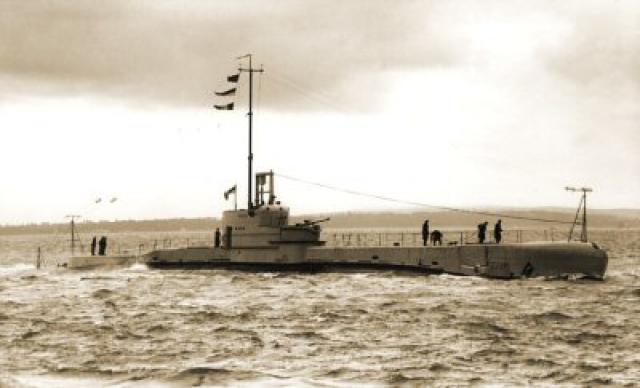 |
| HMS Regent, a Rainbow class submarine. |
British submarine HMS Regent is operating about 10 miles off Bari, Italy in the Adriatic when it spots 188-ton Italian freighter Maria Grazia. It rams the small ship, an auxiliary barquentine (sailing ship), sinking it without taking much damage to itself from the wooden ship.
The Italian Navy begins Operation CV, a resupply operation between Taranto to the Italian bases in Libya.
Some Fulmars flying off HMS Illustrious are forced to land on Crete. The Greeks intern the four crew.
At Malta, new procedures are implemented by the War Office for unexploded bombs. German bombs have electrical fuses that are more difficult to handle, and the instructions provide useful information that helps in their disposal.
French submarine Narval is now operating out of Malta and completes its first patrol today. It is a quiet day despite fair weather, with no air raids.
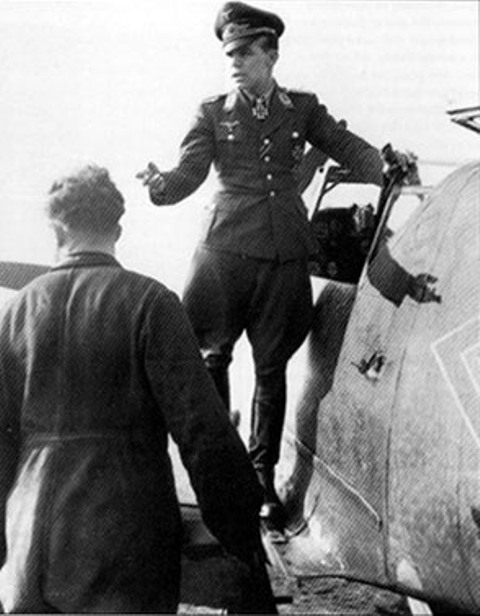 |
| Helmut Wick, who filed five claims for Spitfires today. |
One must remember that, while Mussolini's army is weak, he has just as much ability as Hitler does to embroil the Axis in new wars. Mussolini does the following today in a series of directives and messages:
- Orders Marshal Graziani to cancel all plans to attack Yugoslavia;
- Emphasizes the necessity of the Italian Army at Sidi Barrani to attack and occupy Mersa Matruh;
- Steps up planning for an attack on mainland Greece through Albania soon after occupying Mersa Matruh.
A key issue is Crete. Taking it would enhance Axis naval operations in the eastern Mediterranean and support an attack on the major British military bases at Alexandria and Cairo. The Italian army seriously considers invading it, but ultimately rejects such an operation as too difficult, especially before the capture of the Greek mainland. The Italian navy is strong, but replacing losses would be impossible in any reasonable time frame, and the Royal Navy would have something to say about an operation so close to its bases.
Mussolini's directives today somewhat suggest that he is acting at the very least with the Germans' knowledge, and possibly with their blessing (some of the wording in his messages sounds similar to Wehrmacht phrases). However, that is controversial, and the extent of German involvement in any of Mussolini's actions at this stage is unknown.
Anglo/US Relations: Another tranche, the fourth, of US destroyers arrive at Halifax for transfer to the Royal Navy:
- USS Branch,
- USS Hunt,
- USS Mason,
- USS Satterlee,
- USS Laub,
- USS Aulick,
- USS Edwards and
- USS McLanahan.
 |
| Chicago Bears Quarterback Sid Luckman at the New York Polo Ground, 5 October 1940. |
Major General Henry "Hap" Arnold, Chief of Air Corps since 1938, submits a plan to George Marshall, Chairman of the Joint Chiefs of Staff, to create a separate organizational structure for the US Army Air Corps.
Soviet Military: Stalin approves of plans submitted by the Stavka Chief of the General Staff Meretskov. These call for the greatest weight of defense to be attached to the Southwest Front, i.e., in the direction (from Germany) of Kyiv. After the initiation of Operation Barbarossa, this will be the destination for Army Group South. On the German side, the initial plans of attack didn't even contemplate any attack on this axis of advance, but more recent drafts do have an army group heading toward Kyiv from Romania.
French Indochina: Empire Hirohito directs that some French prisoners in Indochina be released. The elite 5th Infantry Division begins withdrawing to China.
China: The Nationalist Chinese having attacked the Communist New 4th Army at Huangqiao ("Yellow Bridge"), Jiangsu Province, on the 4th, the Communists counterattack today. They drive the attacking Japanese off and capture much-needed equipment and other supplies.
American Homefront: Our Gang in "Waldo's Last Stand" is released, starring Robert Blake as Mickey, George Spanky McFarland, Darla Hood, and Carl 'Alfalfa' Switzer.
 |
| The Our Gang lemonade stand in "Waldo's Last Stand." |
October 1940
October 2, 1940: Hitler's Polish Plans
October 3, 1940: British Cabinet Shakeup
October 4, 1940: Brenner Pass Meeting
October 5, 1940: Mussolini Alters Strategy
October 6, 1940: Iron Guard Marches
October 7, 1940: McCollum Memo
October 8, 1940: Germans in Romania
October 9, 1940: John Lennon Arrives
October 10, 1940: Führer-Sofortprogramm
October 11, 1940: E-Boats Attack!
October 12, 1940: Sealion Cancelled
October 13, 1940: New World Order
October 14, 1940: Balham Tragedy
October 15, 1940: Mussolini Targets Greece
October 16, 1940: Japanese Seek Oil
October 17, 1940: RAF Shakeup
October 18, 1940: Convoy SC-7 Catastrophe
October 19, 1940: Convoy HX-79 Catastrophe
October 20, 1940: Convoy OB-229 Disaster
October 21, 1940: This Evil Man Hitler
October 22, 1940: Aktion Wagner-Burckel
October 23, 1940: Hitler at Hendaye
October 24, 1940: Hitler and Petain
October 25, 1940: Petain Woos Churchill
October 26, 1940: Empress of Britain Attack
October 27, 1940: Greece Rejects Italian Demands
October 28, 1940: Oxi Day
October 29, 1940: US Draft Begins
October 30, 1940: RAF Area Bombing Authorized
October 31, 1940: End of Battle of Britain
2020

